Comments
PLANNING WATCH - Canadian wildfires have smothered the midwestern and eastern parts of the United States with toxic smoke. Heat waves and droughts have enveloped most of the world, and killer storms have become the new normal. In response, the most publicized climate change deniers have worked overtime to discredit the explanations offered by natural scientists: Fossil fuel combustion has raised CO2 levels to their highest level in over 800,000 years. Fox News claimed that the toxic smoke resulted from poor forest management. Similarly, the Wall Street Journal informed its readers that the recent air quality emergencies resulted from, “Rotten luck, a combination of random factors in a complicated system.”
In contrast to these fossil fuel guardians, the most important climate change deniers are the mainstream reporters and editors who repeatedly tell us that climate change is man-made or human-made. Unlike Fox News and the Wall Street Journal, they do not dispute the natural science explanations for climate change. Instead they blame all of humanity to hide the findings of social scientists: the climate crisis is linked to our economic system. This ploy conceals the responsibility of fossil fuel companies for rising CO2 levels, the enormous profits they accumulate from the extraction and sale of coal, oil, and natural gas; and self-serving political power.
This deceptive reporting conveys the misleading message that humanity itself is responsible for the climate crisis. But, since the best measure of human impact on climate conditions is the carbon footprint, we now have an accurate tool to compare the actual impacts of different countries and various social and economic groups.
Differences between countries: When we compare carbon dioxide emissions at the country level, we learn that China (28%) and the United State (15%) are the planet’s largest emitters.
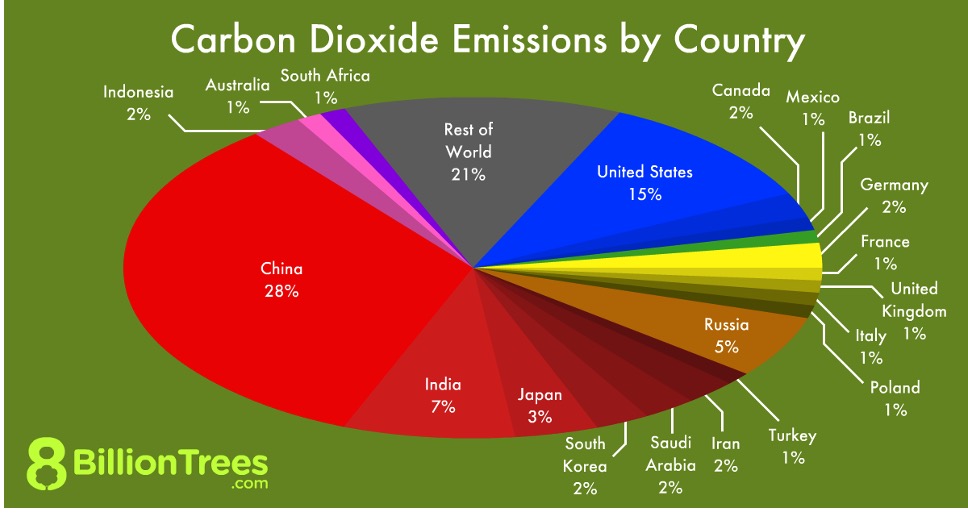
When we compare the per capita CO2 emissions of different countries, the results are strikingly different. China completely disappears from the chart, and the United States ranks 11th, behind such Persian Gulf fossil fuel producers as Qatar, Kuwait, and Bahrain. Clearly, humans, have very different carbon footprints based on their nationality.
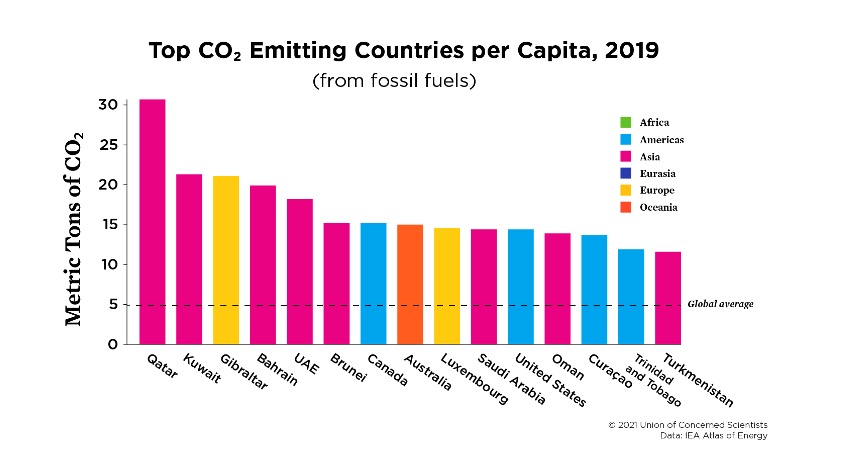
Next, when we examine GHG emissions by country over time, a totally different picture emerges. Historically, the largest CO2 emitter, the United States, has 4 percent of the world’s population but has produced 24.5 percent of all CO2 emissions. In second place, China has 18 percent of the world’s population and has emitted 14 percent of global CO2. This means that the carbon footprint of Americans is, on average, at least four times larger than a typical resident of China.
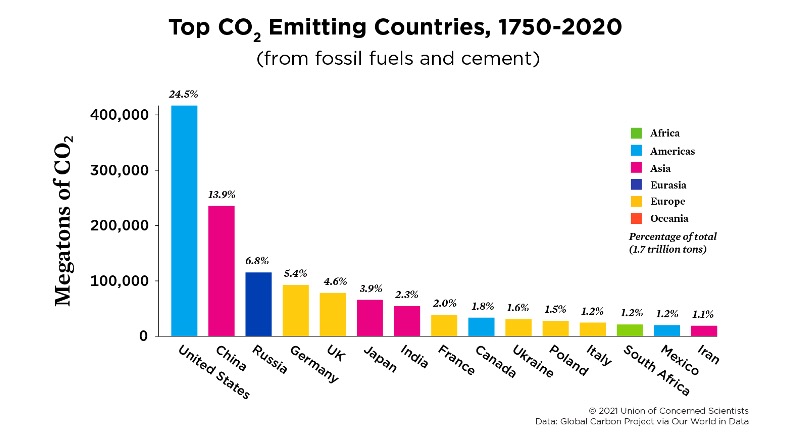
These data should not be misconstrued, however, because US residents are not equally responsible for the CO2 emissions that drive climate change. There are different tremendous differences in the per capita carbon footprint of distinct income groups. Households whose income is over $150,000 per year generate four times the amount of CO2 as households whose income is less than $5,000 per year. This, of course, makes total sense. Families that live in a McMansion with 24/7 heating and air conditioning and also drive several high performance cars, use much more energy and generate far more CO2 than low-income families. The latter typically live in apartments and rely on public transit, not private cars, for mobility.
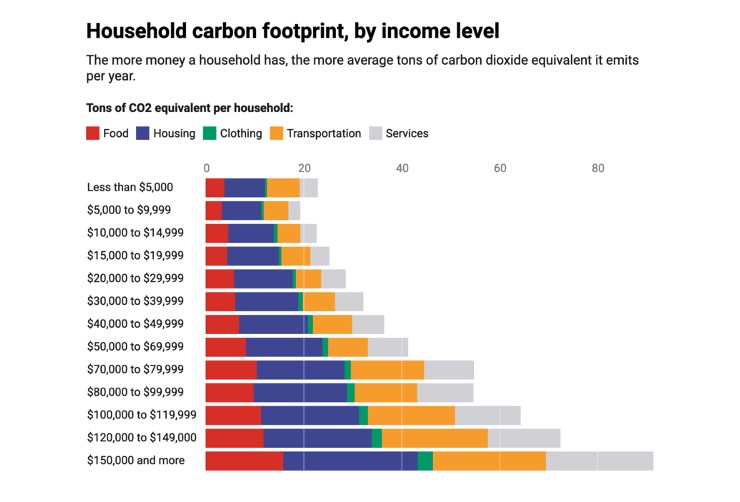
The calculations of historic Greenhouse Gas emissions are more complicated, however, because producers are ultimately responsible for most CO2 emissions, not consumers. The tough question is, therefore, which of the 8 billion humans on the planet earth, through which social institutions, are most responsible for the climate crisis?
The UK’s Guardian newspaper answered this question several years ago. The paper determined that the historical responsibility for CO2 emissions rests with 100 major energy companies. Since the mid-1980s, these businesses have generated 71% of the emissions responsible for the worsening climate emergency. Those at the helm of these major energy corporations are responsible for climate change. In the words of The Guardian, “these are the real climate culprits”
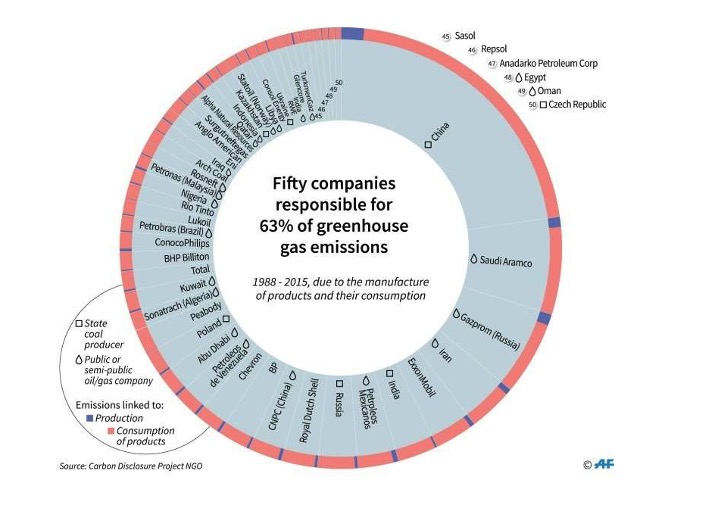
The Guardian has also opened up a Pandora’s box. Those corporations most responsible for the climate crisis are politically powerful and use their enormous financial resources to ensure the survival of their business model. When politically possible, they will quash press reports and scientific studies that jeopardize their profits. But since outright censorship may not be an easy option, their fallback position is the fiction that climate change is “man-made.” Blame is deflected from major energy companies to all of humanity.
While this approach might work in the short run, their gravy train will eventually end, probably collapsing from its own weight. When this happens, we may also find out if fossil fuels were eventually replaced by renewables, or alternatively, most of humanity perished from starvation, mega-storms, heat waves, wildfires, droughts, and sea-level rise. Either way, the major energy companies will be toast, even if the moguls can temporarily retreat to underground bunkers.
(Dick Platkin is a retired Los Angeles city planner who writes about local planning issues for CityWatchLA. He is a board member of United Neighborhoods for Los Angeles (UN4LA). Previous Planning Watch columns are available at the CityWatchLA archives. Please send any questions to [email protected].)
















